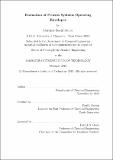Evaluation of process systems operating envelopes
Author(s)
Stuber, Matthew David
DownloadFull printable version (2.849Mb)
Other Contributors
Massachusetts Institute of Technology. Department of Chemical Engineering.
Advisor
Paul I. Barton.
Terms of use
Metadata
Show full item recordAbstract
This thesis addresses the problem of worst-case steady-state design of process systems under uncertainty, also known as robust design. Designing for the worst case is of great importance when considering systems for deployment in extreme and hostile environments, where operational failures cannot be risked due to extraordinarily high economic and/or environmental expense. For this unique scenario, the cost of "over-designing" the process far outweighs the cost associated with operational failure. Hence, it must be guaranteed that the process is sufficiently robust in order to avoid operational failures. Many engineering, economic, and operations research applications are concerned with worst-case scenarios. Classically, these problems give rise to a type of leader-follower game, or Stackelberg game, commonly known as the "minimax" problem, or more precisely as a max-min or min-max optimization problem. However, since the application here is to steady-state design, the problem formulation results in a more general nonconvex equality-constrained min-max program, for which no previously available algorithm can solve effectively. Under certain assumptions, the equality constraints, which correspond to the steady-state model, can be eliminated from the problem by solving them for the state variables as implicit functions of the control variables and uncertainty parameters. This approach eliminates explicit functional dependence on the state variables, and in turn reduces the dimensionality of the original problem. However, this embeds implicit functions in the program, which have no explicit algebraic form and can only be approximated using numerical methods. By doing this, the max-min program can be reformulated as a more computationally tractable semi-infinite program, with the caveat that there are embedded implicit functions. Semi-infinite programming with embedded implicit functions is a new approach to modeling worst-case design problems. Furthermore, modeling process systems--especially those associated with chemical engineering--often results in highly nonconvex functions. The primary contribution of this thesis is a mathematical tool for solving implicit semi-infinite programs and assessing robust feasibility of process systems using a rigorous model-based approach. This tool has the ability to determine, with mathematical certainty, whether or not a physical process system based on the proposed design will fail in the worst case by taking into account uncertainty in the model parameters and uncertainty in the environment.
Description
Thesis (Ph. D.)--Massachusetts Institute of Technology, Dept. of Chemical Engineering, 2013. This electronic version was submitted by the student author. The certified thesis is available in the Institute Archives and Special Collections. Cataloged from student-submitted PDF version of thesis. Includes bibliographical references (p. 229-238).
Date issued
2013Department
Massachusetts Institute of Technology. Department of Chemical EngineeringPublisher
Massachusetts Institute of Technology
Keywords
Chemical Engineering.